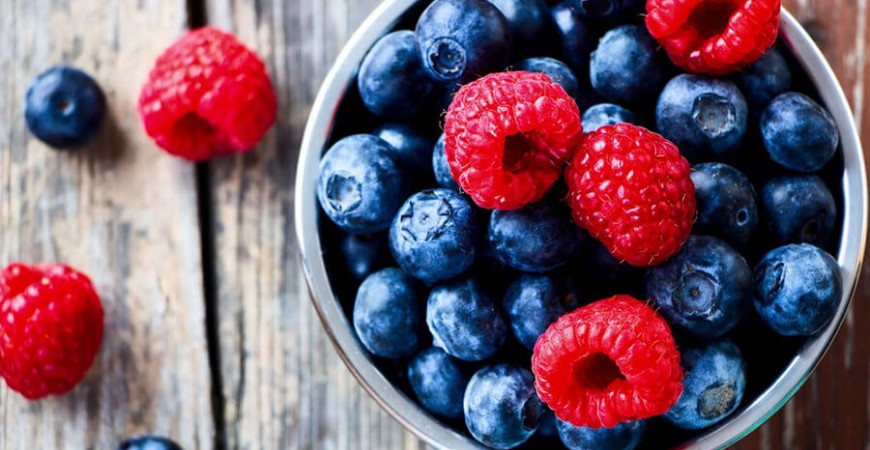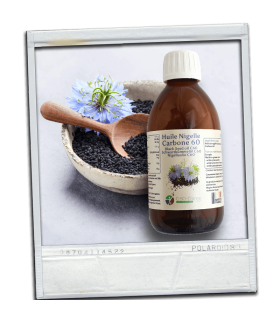Top 5 Antioxidants You Should be Taking
Table of Contents
- 1- Vitamin A and benefits
- 2- Vitamin E and benefits
- 3- Resveratrol and benefits
- 4- Lycopene and benefits
- 5- Carbon 60 and health
- 6- Liposomal Vitamin C
If this is not already the case, you should take antioxidants such as vitamin C, carbon 60 and others. You will find here data on antioxidants and their organization, and the 5 main antioxidants to take to reinforce your health.
What are antioxidants?
«An antioxidant is a material that inhibits oxidation, especially to combat the degradation of food, or a molecule that removes oxidants normally harmful in a living structure. »
In different words, an antioxidant is a material that «protects the body from the damage caused by harmful molecules called free radicals. Many professionals believe that this damage is a factor in the development of blood vessel health problems (atherosclerosis), cancer and other conditions.»
Your body can create free radicals in many ways, such as:
- The byproducts of the normal processes that are made in your body (such as the burning of sugars as a source of energy and the release of digestive enzymes to break down foods).
- When the body breaks down certain therapeutic products.
- Via chemical pollutants.
How do antioxidants work ?
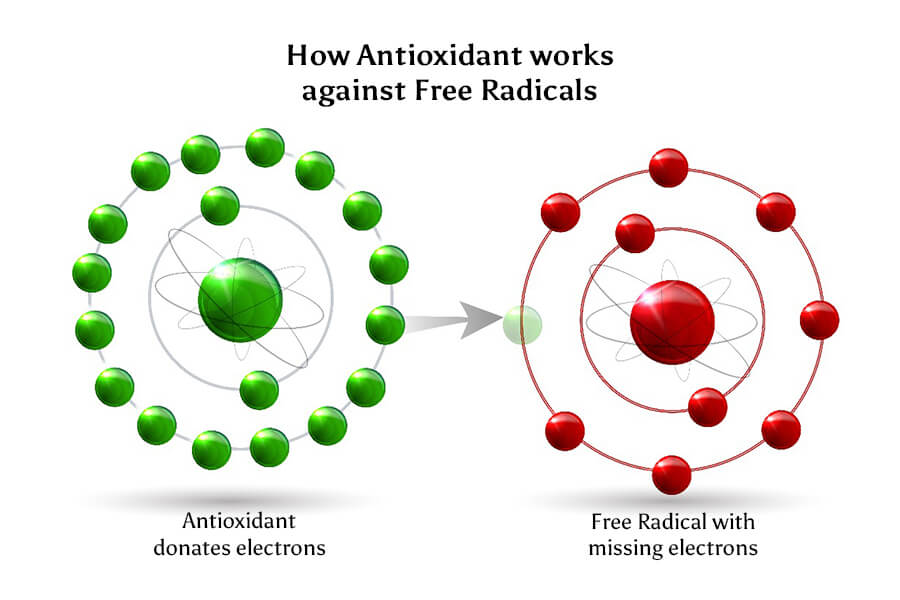
All the matter of our world is composed of atoms. And when they are connected together, they become molecules. Human anatomy is made up of many of these molecules, forming our genetic code, our proteins, our fats, and so on.
Humans maintain their structures and functions, remain alive, with known chemical effects called metabolism. These chemical effects break down molecules into smaller elements. Then the smaller molecules rearrange themselves into bigger elements.
It is necessary that a molecule be stabilized. For a molecule to be stabilized, it must have the right amount of electrons. If this is not the case, it can become a free radical.
By reacting with different molecules, free radicals damage other molecules, such as DNA or the cell membrane. This can be very risky and even lead to a chain reaction, like a cascading domino effect. Scientists indicate that these free radicals are likely to participate in the development of pathologies and diseases.
Fortunately, antioxidants can neutralize these free radicals by providing them with the electrons they need to be properly balanced and actively reduce the risk.
The 5 best antioxidants you should take
Check out our list of 5 main antioxidants that you should take to comfort and maintain your health:
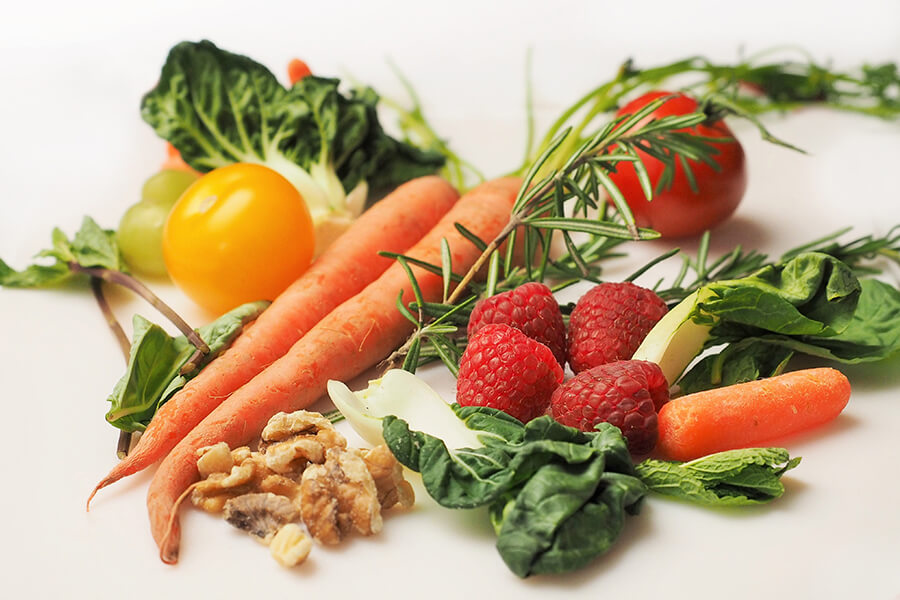
1- Vitamin A and benefits
Vitamin A is the name of a set of fat-soluble retinoids, containing retinol, retinal and retinyl esters. Its antioxidant characteristics are well known. This vitamin supports:
- Immune function
- Vision
- Reproductive system
- Cell growth and communication
- Heart health
- Lung Health
- Kidney health
- Maintenance of other organs
What is the role of vitamin A ? It is a specially needed component for sight, because it is a necessary part of rhodopsin, a protein that absorbs light in the retinal receptors and supports the conjunctival and corneal membranes.
What are the foods rich in vitamins A ?
There are two types of vitamin A: preformed and provitamin A.
- Preformed - It is found in meat, poultry, fish and dairy products
- Provitamin A - In fruits, vegetables and herbal products (the most common type is beta-carotene)
You can find it in a choice of foods, such as:
- Beef liver and other offal (but these foods are also high in cholesterol, so limit the amount you eat).
- Some kinds of fish, like salmon.
- Green leafy vegetables and other green, orange and yellow vegetables such as broccoli, carrots and squash.
- Fruits, and even especially cantaloupes, apricots and mangos.
- Milk-based products, which are among the main sources of vitamin A.
- Fortified breakfast cereals.
The amount you need depends on your age and your reproductive status. See the attached chart for recommended permanent intake:

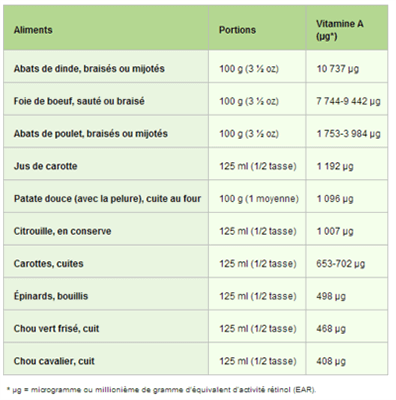
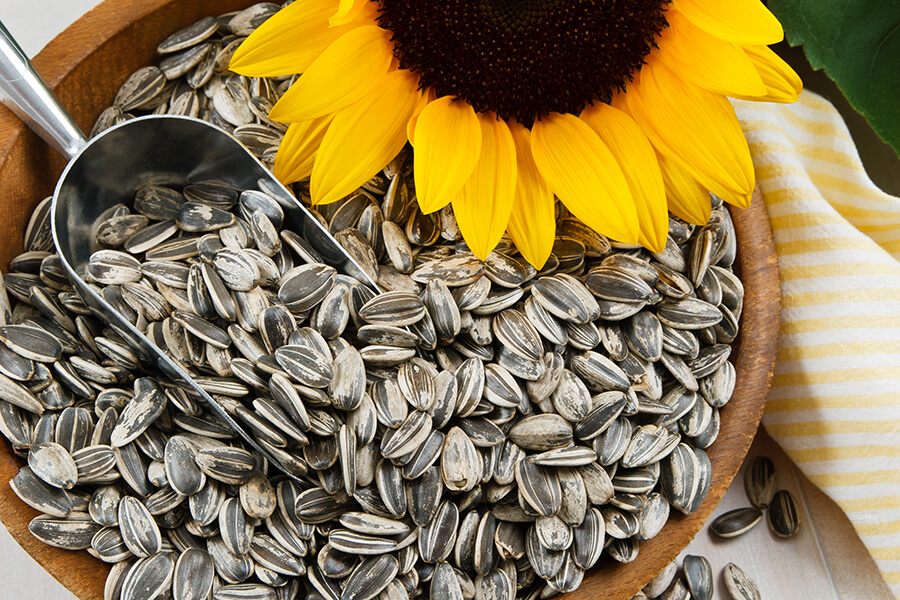
2- Vitamin E and benefits
Vitamin E is a lipid-soluble antioxidant compound. Although it exists in 8 chemical forms, only one form meets the requirements of human consumption: alpha (or α) tocopherol.
What are the benefits of vitamin E ? Vitamin E is a fat-soluble antioxidant that stops the production of ROS (reactive oxygen species) formed during the oxidation of fat. Scientists are investigating whether, by limiting the production of free radicals, vitamin E can help prevent chronic diseases associated with free radicals.
The body creates ROS when food is transformed into energy. Antioxidants such as vitamin E can protect cells from any damage caused by ROS.
How much vitamin E per day ?
You will find the recommended intake of vitamin E, and the foods in which the antioxidant is frequently present:

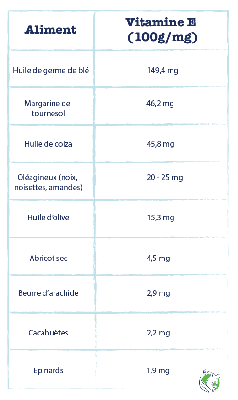

3- Lycopene and benefits
Lycopene is a bright red carotene and carotenoid pigment and a phytochemical compound found in tomatoes and other red fruits and vegetables. Nevertheless, it is not found in cherries or strawberries. It is authorized as a food coloring in the United States! That's why spaghetti sauce stains your cookware, lycopene is often responsible. This gives vegetables their bright red color.
Studies suggest that taking lycopene may reduce the risk of cancer or cardiovascular disease. It also helps protect the skin from the sun's rays.
Food rich in lycopene:
The recommended dose has not yet been formally established. However, the majority of clinical studies focused on the amount of lycopene-containing foods that participants ate instead of the quantities consumed.
Eating a variety of brightly colored fruits and vegetables every day can be a more useful way to prevent chronic diseases than taking supplemental lycopene.
Eat 5 servings of deep-colored fruits and vegetables daily to benefit from the qualities of lycopene. The benefits include:
- Cancer Prevention
- Control of papillomavirus
- Promotes eye health
- Decreases neuropathic pain
- Improves brain health
- Lowers blood pressure
- Promotes heart health
- Relieves bone stress
Lycopene is found in foods and beverages such as:
- Tomatoes or canned tomato coulis
- Watermelon
- Grapefruit
- Guava
- Apricots
- Carrots
- Red cabbage
- Mangoes
- Papaya

4- Resveratrol and benefits
Resveratrol is a polyphenic bioflavonoid antioxidant produced by many plants and present in foods and liquids. It is naturally produced by plants when they are attacked or injured by pathogens (bacteria or fungi). Its ability to fight against stressors such as radiation and diseases makes resveratrol a very good antioxidant supplement. One of the most powerful and strong polyphenols would be the damage caused by free radicals and aging and even against cancer.
Scientists have found that resveratrol can reduce the risk of heart disease, as well as other ailments.
The benefits of resveratrol were unheard of when scientists discovered that yeast, other bacteria, insects and animals that eat resveratrol have a longer life.
Various studies have validated its amazing anti-aging benefits, evidenced by studies conducted on fruit flies, mice, fish, and nematode worms, which have lived longer than reference groups not treated with this phytonutrient.
It is usually found in superfoods such as red wine. Did you know that Plato even talked about the benefits of resveratrol and how to consume red wine in moderation?
«Nothing more excellent or more precious than wine has ever been granted to man by the gods.»
- Plato -
Which foods are rich in resveratrol ?
You will find resveratrol in the following foods and drinks:
- Red wine
- Raw cacao
- Blueberries
- Blackberry
- Cranberries
- Red grapes
The dosage instructions vary depending on your age and your current health. Generally, people take between 250 and 500 milligrams every day. It is important to note that this amount is usually less than the amounts used in the studies, but high doses have not been shown to be safe. They can interact with anticoagulants like Advil.
Talk to your doctor before taking this antioxidant.

5- Carbon 60 and health
C60-based Fullerenes 60 already have a variety of uses and applications in various industries. Carbon 60 studies have uncovered convincing data on the possible use of C60 in several applications:
- Biomedical
- Chemical research
- Nanotechnology
- Health and Medicine
- Electronic Development
Click here to read more about a synthesis of Fullerene's latest research in medicine published in the Royal Society of Chemistry Journal. This study delves into the following properties:
- Antiviral activity (Anti-HIV-1)
- Photodynamic therapy
- Antioxidant properties of C60
- Anti-cancer properties
- Immunological properties
- Biological applications of endohedral metallofullerenes
Research shows that C60 has antioxidant properties and can even extend life expectancy. In a new survey of laboratory rats, scientists found that C60 doubled the life expectancy of rats. For 30 hours, the gastrointestinal tract absorbed the dissolved C60 Fullerenes and released them without causing damage. Other scientists indicate that, although it is rapidly evacuated by the body, only 96 hours, lasting changes in organs and cells must have been developed, such as DNA enhancement. Finally, the life expectancy of the rats was doubled.
Scientists have found that C60 is a very powerful antioxidant, 172 times more effective than vitamin C! He is very well armed to neutralize the disastrous consequences of free radicals. Still more interesting is the idea that during this work, the dosage of carbon 60 protected the liver.
They have been able to certify, with this work, that carbon 60 is a "powerful protector of the liver" operating according to a "system of free radical scavenging».
What is the daily dosage of c60 ?
Although the appropriate recommended dosage has not been publicly established, we have received many suggestions from our consumers over the years.
You are free to take the C60 at any time of the day, with or without food. It all depends on your preferences.
Some of our customer-athletes prefer to take their carbon 60 before training, which has the effect of regularly improving their records.
C60 France oils are here to give you a quick boost, for a better life, healthier.
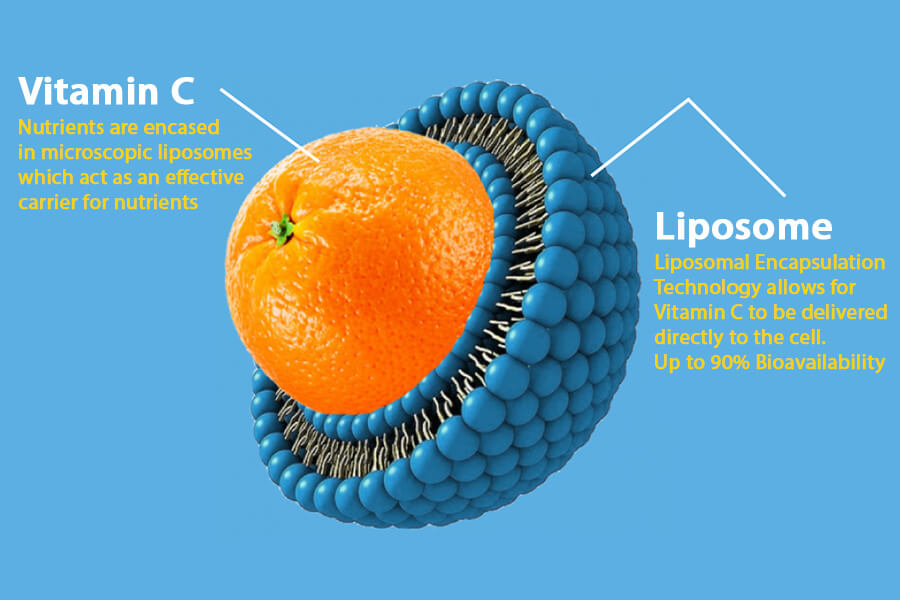
6- Liposomal Vitamin C
Liposomal Vitamin C is much better assimilated, up to 90% directly into the cells of the body. Studies show that so-called "classic" vitamin C (non-liposomal), allows only 10 to 20% absorption.
Liposomal vitamin C is produced from L-ascorbic acid E300 or Sodium ascorbate E301, encapsulated in phospholipids from sunflower. This process increases its intestinal and cellular absorption.
Liposomal Vitamin C is produced by a natural process. It is a vitamin C that is encapsulated (surrounded by a kind of protection that will allow it to go to the heart of our cells). This "shell" is a micro particle of fat, to allow it to cross the membranes of the body and go directly to the very heart of our cells to deposit the vitamin.
Breast milk also contains all-natural liposomes, which increases the bioavailability of nutrients for the baby.
The liposome provides perfect tolerance, is much better absorbed, no acidity, no digestive disorders or intestinal disorders. The kidneys are not solicited as with conventional vitamin C.
Thus, liposomal vitamin C brings the excellent benefits of vitamin C without bringing the disadvantages if it is consumed at high dose!
What are the benefits of vitamin C ?
- Scientific studies on vitamin C have demonstrated its powerful action against cancer.
- Vitamin C as vitamin E is an antioxidant vitamin that fights against free radicals. It is believed to be a key factor in the prevention of cataracts by fighting free crystal-induced opacification of the lens.
- It actively participates in the production of collagen (skin cement), and prevents wrinkles.
- Vitamin C is also involved mainly in the repair of collagen bones, ligaments, cartilage and small blood vessels (capillaries).
- It promotes the absorption of dietary iron.
- Vitamin C allows a better resistance to contaminations (immunity) by strengthening the action of leucocytes, the cells of the body that protect us from external aggressions.
- It helps people with allergies fight against asthma and colds.
Frequently Asked Questions
What are antioxidants?
Antioxidants are molecules that fight free radicals in your body, reducing oxidative stress and preventing cell damage.
Why should I take Vitamin C?
Vitamin C is crucial for the repair and regeneration of tissues, protection against heart disease, and absorption of iron.
What benefits does Vitamin E provide?
Vitamin E is a powerful antioxidant that protects your skin from damage and helps maintain a healthy immune system.
How does Beta-Carotene benefit my health?
Beta-Carotene boosts immune function and has strong anti-aging properties by converting to Vitamin A in the body.
Why is Selenium important?
Selenium is essential for thyroid gland function, DNA production, and protecting the body from infections and oxidative damage.
What are Polyphenols and where can I find them?
Polyphenols are antioxidants found in plant-based foods like fruits, vegetables, and grains that support heart health and diabetes management.
Can antioxidants help with skin health?
Yes, antioxidants like Vitamin E and Polyphenols protect the skin from sun damage and can improve skin texture and reduce signs of aging.
Are there any side effects of taking antioxidants?
Excessive intake of some antioxidants, particularly in supplement form, can be harmful. It's best to consult with a healthcare provider before starting any new supplement regimen.
How can I incorporate antioxidants into my diet?
Include a variety of fruits, vegetables, nuts, and whole grains in your diet to ensure a rich supply of antioxidants.
What is the best source of antioxidants?
Whole foods are the best sources of antioxidants because they offer a variety of nutrients that work synergistically.









